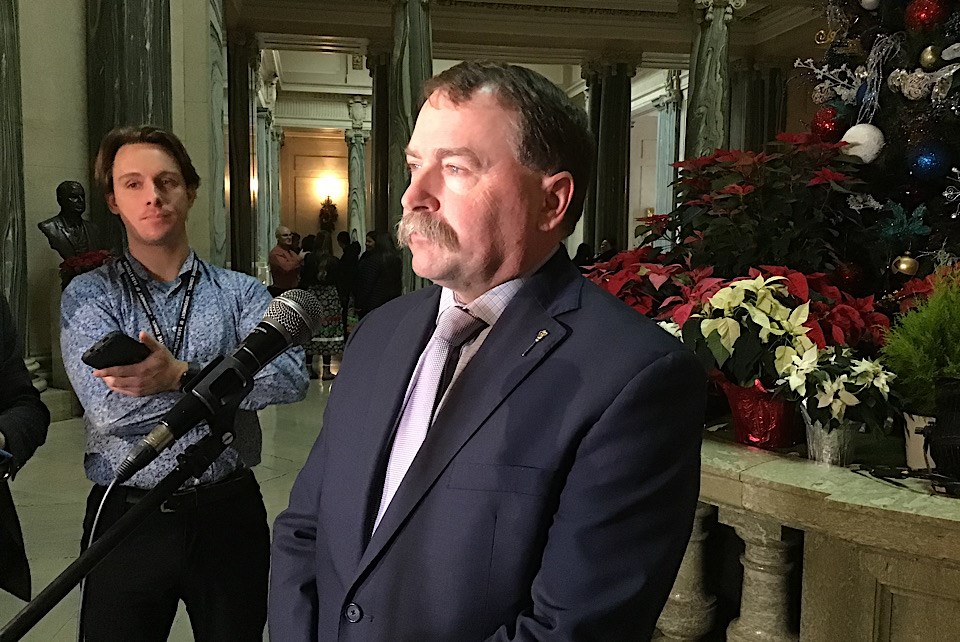REGINA - While the new Provincial Agriculture Minister has only been in the role since early-November, there was plenty to do and plenty to talk about.
Following the Provincial Election on Oct. 28, Daryl Harrison was chosen by Premier Scott Moe to be the Agriculture Minister on Nov. 7 – Harrison’s first Cabinet position. Harrison had experience working in the Ministry of Agriculture as a Legislative Secretary for Value Added Agriculture and Livestock Engagement.
Harrison’s first public event as Ag Minister was Canadian Western Agribition a few weeks after being appointed. In a year-end interview with SaskAgToday.com, Harrison said he had conversations with the Saskatchewan Stock Growers Association and Saskatchewan Cattlemen’s Association about good things happening within the cattle industry as well as issues concerning to the groups.
One positive was how cattle prices have performed this year. Prices for feeder steers and feeder heifers in Saskatchewan, for example, increased significantly between February and December with low supply and high demand being the primary factor among others. Prices for bred heifers and young bred cows are also reaching record highs.
“I think overall, in the cattle industry, everybody’s very, very relieved that the prices are trending upward and personally I’ve been waiting for a fall like this since 2003 when BSE hit, but I think very upbeat,” Harrison said of the mood producers are feeling about the current state of the cattle market.
Another positive in those conversations was the snowfall in the weeks leading up to, and after, Agribition. Harrison said it’s “reassuring that there is going to be moisture there in the spring and everyone is looking forward to a good growing season on the crop land and good pasture in hay land conditions going forward.”
According to the Water Security Agency’s Conditions at Freeze-Up Report, moisture conditions were better at freeze-up this year compared to last year when it was drier.
While the snowfall and high prices were something to admire, 2024 had its fair share of challenges, including labour disruptions to Canada’s supply chain.
On Aug. 22, Canadian National Railway (CN Rail) locked out its workers, while workers from Canadian Pacific Kansas City Ltd (CPKC) went on strike, halting national railway traffic. Not long after, Federal Labour Minister Steven MacKinnon ordered a return to work and impose binding arbitration. Farm groups welcomed Ottawa’s intervention, but the Teamsters Canada Rail Conference – the union that represents nearly 10-thosuand workers from both CN and CPKC – challenged the federal government’s directive to resume operations by filing an appeal with the Federal Court of Appeals.
September and October saw strikes at the Port of Montreal, Ports in B.C., and at grain terminals in Metro Vancouver also cause disruptions to the supply chain. Ottawa had to step in and stop the dispute between port workers and their employer but a deal was reached between the Grain Workers Union Local 333 and the Vancouver Terminal Elevators Asscociation (VTEA)
“Any disruptions, whether its rail or ports, even the threats of strike action or lockouts disrupts that supply chain and it’s definitely like a pipeline – as soon as there’s a hiccup along that system it backs products up,” Harrison said of the disputes this year. “Any disruption takes a little bit longer once that’s resolved to get that backlog taken care of so the sooner these disruptions get resolved, that’s just peace of mind for Saskatchewan and our economy and certainly our producers here in the province.”
Harrison also says each time there is a disruption it jeopardizes Canada’s reputation as a reliable supplier, given the country, and by extension Saskatchewan, is export-oriented. He adds that’s why it’s important to continue to call on the federal government to make the railways an essential service and to make reliability a priority when discussing trade with our trading partners.
“They need to know that they can get what they want, when they need it.” Harrison stated.
Another notable news item this year was President-Elect Donald Trump suggesting a 25 per cent tariff on Canadian and Mexican goods flowing into the U.S., should the two countries not address the issue of border security. Trump also made clear of his intentions to re-negotiate the United States-Mexico-Canada free trade agreement when its due for a review in 2026.
Harrison reached out to his peers in Alberta, Manitoba, and Ontario to discuss it as well as bring it up in a conversation with Federal Ag Minister Lawrence MacAulay during Agribition. Harrison says they need to form a united front alongside the Premiers and federal government to deal with the possible tariffs.




